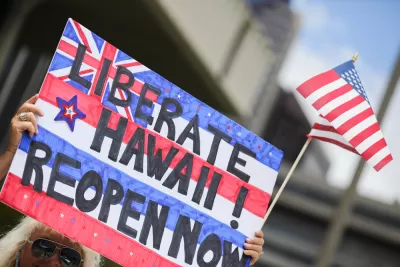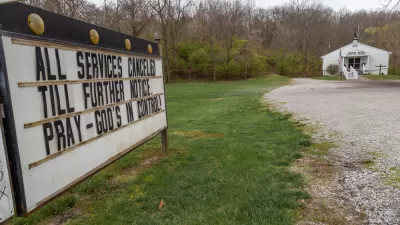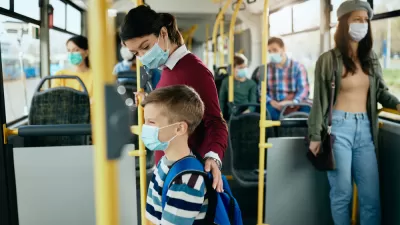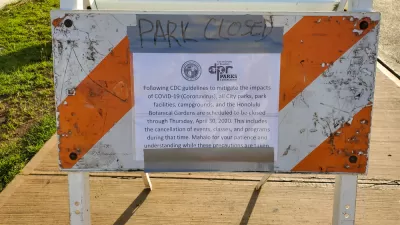The U.S. Justice Department has intervened in a lawsuit on behalf of the plaintiffs challenging Hawaii's mandatory two-week quarantine for travelers arriving on the island state. The Trump-appointed judge did not react favorably.

As posted last week, Hawaii has the nation's lowest COVID-19 infection rate per capita, with 61 cases per 100,000 people, though the 7-day moving average of new cases increasing since May 28. While their triumph is largely a result of successful coronavirus testing and contact tracing, a mandatory 14-day self-quarantine for arrivals which has been in effect since March 26 also deserves much credit by preventing inter-state travelers from introducing the infection unknowingly. [The program will soon allow an alternative to quarantine – see below.]
On June 23, "the Justice Department issued a routine news release announcing that it had filed a 'statement of interest' — essentially a friend-of-the-court brief — arguing that an order issued by Gov. David Ige of Hawaii imposing a two-week quarantine unconstitutionally infringes on the rights of nonresidents seeking to visit the state," reports Josh Gerstein for POLITICO.
Most courts have received such briefs with little controversy, but U.S. District Court Judge Jill Otake in Honolulu quickly fired off an order questioning the federal government’s right to submit a brief without court permission and accusing the Justice Department of raising legal issues not raised by the plaintiffs, who are mostly out-of-state residents with property in Hawaii.
The unexpected move by Otake appears to be the first serious judicial resistance to the drive that Attorney General William Barr announced in April to scrutinize state and local lockdown measures aimed at containing the coronavirus.
The lawsuit "filed by Nevada and California residents who own property in Hawaii," according to the AP, "argue that their rights under the Fifth and Fourteenth Amendments have been violated by the denial of their right to travel, liberty and equal protection," reported Brigette Honaker for Top Class Actions.
In response to the Justice Department's claim that the quarantine discriminates against non-residents, lawyers for Ige wrote [pdf], “It treats non-residents exactly the same as returning residents since both are subject to its requirements," adds Gerstein.
The same provision applies to the new Tri-State (NY, NJ, Conn.) COVID-19 Travel Advisory that took effect June 25 "for anyone returning from travel to states that have a significant degree of community-wide spread of COVID-19." [See related post below].
Hawaii to offer alternative to quarantine
On August 1, travelers to Hawaii will be able to opt-out of the quarantine if they "show proof that they had a negative molecular-based COVID-19 test result within 72 hours of their travel," reported Eleni Gill for Honolulu Civil Beat on June 24.
The program is similar to one adopted by Alaska earlier this month, which removed its quarantine for those who show negative test results.
Because the program will likely lead to an increase in travelers to Hawaii, Ige said officials expect to see more coronavirus cases, but Hawaii hospitals are equipped with the capacity to handle new infections.
As for the intervention by the Justice Department, "Otake said she wouldn’t consider the Justice Department’s arguments — at least at this initial stage of the case where the plaintiffs are seeking an injunction against the state policy," adds Gerstein.
Related in Planetizen:
-
Pandemic Reversal: The New Tri-State Quarantine, June 25, 2020
FULL STORY: Court rebukes Justice Department move in Hawaii quarantine case

Study: Maui’s Plan to Convert Vacation Rentals to Long-Term Housing Could Cause Nearly $1 Billion Economic Loss
The plan would reduce visitor accommodation by 25% resulting in 1,900 jobs lost.

Alabama: Trump Terminates Settlements for Black Communities Harmed By Raw Sewage
Trump deemed the landmark civil rights agreement “illegal DEI and environmental justice policy.”

Why Should We Subsidize Public Transportation?
Many public transit agencies face financial stress due to rising costs, declining fare revenue, and declining subsidies. Transit advocates must provide a strong business case for increasing public transit funding.

Paris Bike Boom Leads to Steep Drop in Air Pollution
The French city’s air quality has improved dramatically in the past 20 years, coinciding with a growth in cycling.

Why Housing Costs More to Build in California Than in Texas
Hard costs like labor and materials combined with ‘soft’ costs such as permitting make building in the San Francisco Bay Area almost three times as costly as in Texas cities.

San Diego County Sees a Rise in Urban Coyotes
San Diego County experiences a rise in urban coyotes, as sightings become prevalent throughout its urban neighbourhoods and surrounding areas.
Urban Design for Planners 1: Software Tools
This six-course series explores essential urban design concepts using open source software and equips planners with the tools they need to participate fully in the urban design process.
Planning for Universal Design
Learn the tools for implementing Universal Design in planning regulations.
Smith Gee Studio
Alamo Area Metropolitan Planning Organization
City of Santa Clarita
Institute for Housing and Urban Development Studies (IHS)
City of Grandview
Harvard GSD Executive Education
Toledo-Lucas County Plan Commissions
Salt Lake City
NYU Wagner Graduate School of Public Service





























